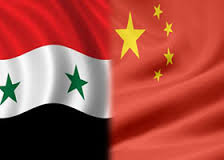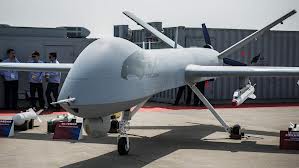Formal diplomatic relations between China and Syria were established on 1 August 1956. Like Russia, China has maintained military and economic ties with Syria. Following the Sino-Soviet Split of 1960, in 1969, Chief of Staff of the Syrian Army and Hafez al-Assad loyalist Mustafa Tlass visited Beijing on a military mission to negotiate an arms deal with the Chinese Communist Party. This controversial visit occurred two months after the border clashes between Chinese and Soviet militaries on the Ussuri River during the Sino-Soviet border conflicts of 1969. During the visit, Tlass waved Mao Zedong’s “Little Red Book” and allowed himself to be photographed as a direct provocation to the Soviet Union. During the 1980s, Beijing provided Damascus with intermediate-range ballistic missile systems as Soviet political influence in the Middle East consistently waned. On 19 October 1999, Chinese Defense Minister Chi Haotian visited Tlass in Damascus to discuss expanding military relations between China and Syria. Since 2010, China has sent and received delegations in countless political and economic exchanges between itself and Syria.
Economic trade between Syria and China is profoundly one-sided. Whereas imports from Syria make up less than 1 per cent of Chinese trade, imports from China make up around 7 per cent of Syrian trade. This speaks volumes as China is Syria’s number four trade partner in total trade and number one partner outside of its immediate Middle Eastern neighbors. China also has active oil companies involved in Syria’s petroleum industry and has contributed to building various construction and manufacturing projects in Syria.
Politically, both countries have been staunch supporters of each others’ domestic and foreign policies. China has been consistent in supporting Syria in its position on the Golan Heights issue while Syria reinforced the one-China position and defended Chinese policies relating to Tibet, Xinjiang, and its domestic human rights record.

China’s stance on the current civil war in Syria is irrefutably rooted in its perspective on foreign intervention. Events such as the Iraq War in 2003, military intervention in Libya in 2011, and NATO’s bombing of the former Yugoslavia in 1999 during which China lost its embassy in Belgrade have influenced China’s belief in the necessity of a UN Security Council-authorized intervention. Although the United Nations Charter does not allow [1] military intervention of one state by another (other than in exceptional cases), the United States led NATO alliance justified the bombing Yugoslavia on the grounds of “sufficient international support[2] ”. By the time intervention in Iraq was on the table, authorization by the Security Council was once again not achieved and[CU3] NATO was so divided that “sufficient international support” from a recognized international military alliance was reduced to a “coalition of the willing[4] ” and not a NATO operation.
The 2011 Libyan intervention was better justified by the United Nations Security Council Resolution 1973 and had the support of various NATO and non-NATO states. China and Russia abstained from voting in the resolution and were later labeled by the West and Arab states as being “irresponsible powers.” Resolution 1973 mandated a ceasefire of aggression towards civilians, necessitated all measures to protect civilians short of foreign intervention, and established the no-fly zone and strengthened the arms embargo, and it severely weakened the Gaddafi government indirectly leading to Gaddafi’s capture and death. It must be stressed that the relationship is indirect but, in an area where logic does not always prevail, the humanitarian undertones in Resolution 1973 was causally linked to regime change in the interpretations from China and Russia. [5]
Whereas regime change is never[CU6] explicitly the intention of military intervention, it nevertheless changes government-rebel dynamics that can critically erode power for the political elite. For China and Russia, without a mature, transparent, and internationally legitimized-opposition government in the conflicted state, intervention will almost always be eschewed to maintain the familiar status quo. Regime change, then, also created economic implications for Libya’s allies and investors. Chinese media estimated that regime change could cost Chinese companies more than 20 billion USD as many states in conflict are temporary homes for tens of thousands of Chinese citizens.
Yet, China has nothing to lose when vetoing intervention in Syria[7] (countless times since 2011) as it prevents a “double precedent” of intervention, rescues Russia from international isolation, and gives China the strategy of “wait and see”. During a pre-Summit briefing at the G20 Summit in St. Petersburg on 5 September 2013, Chinese deputy finance minister, Zhu Guangyao claimed that “military action would have a negative impact on the global economy, cause[ing] a hike in the oil price.”
On 14 September 2013, the long-awaited United Nations Report on the use of chemical weapons in Syria was released confirming the “relatively large scale” usage of sarin. The 38-page report, however, did not explicitly lay the blame on the Syrian government and, despite describing a war crime, somehow remained “studiedly neutral and decidedly limited”. A few days later, on 17 September 2013, the permanent members of Security Council met once again to draft a proposal to eradicate the supplies of chemical weapons in Syria. This was met with disagreements between the United States and Russia on a clause that would involve military intervention should negotiations between Syria and other states disintegrate.
On 27 September 2013, the Security Council voted unanimously to mandate that Syria eliminate its arsenal of chemical weapons. Two days later, on 29 September 2013, Assad spoke to Italy’s Rai News 24 TV announcing his compliance. China lauded itself for playing a “constructive role” in otherwise “tough negotiations”. Chinese Foreign Minister Wang Yi noted that “neither Syria nor the Middle East region can afford another war,” conveniently overlooking the fact that this UN resolution was implemented for the single purpose of destroying chemical weapons as the civil war rages on.
To conclude a month of nearly diplomatic fury, it is fitting that George Packer asked the questions: do the strong have a responsibility to protect the weak? For China, it seems the conflict does not stem from the concept of humanitarian intervention alone but fundamentally rests on interpretations of the legitimacy and constitution of “strong” and “weak” states in the greater context of international relations.




